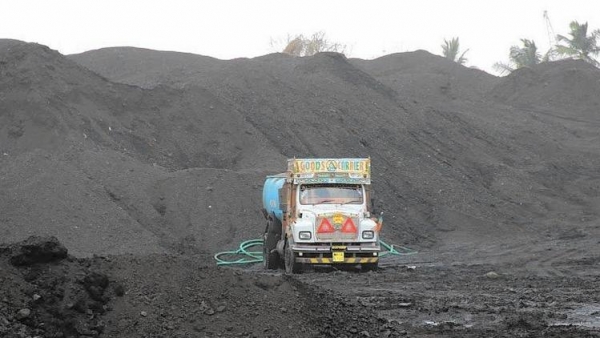In India, Mumbai's mountains of imported coal pose health hazard

When Shyam Goel, 21, won admission to Mumbai's Marine Engineering & Research Institute, he was overjoyed.
The facilities could not be better. The school-affiliated hostel where he would live was neat. Yet two years later, he regrets leaving his hometown of Lucknow, in the northern state of Uttar Pradesh, to study at India's premier maritime institute.
Located near the port of India's booming financial capital, the institute, known as MERI, is nearly a stone's throw from enormous black mountains of imported coal.
The sea breeze lifts dust off the 19 acres of coal, dispersing particles that leave residents and MERI students vulnerable to potentially fatal respiratory diseases.
Students at the hostel wear masks, says Goel, clad in a white uniform that has lost its sheen. "We have to wash it twice a day," he says. "A book lying on the table is covered with dust within an hour. It is very hard to concentrate on studies in an atmosphere like this."
MERI Principal A.N.S. Neti says the campus is meticulously dusted each day. Workers say they have been sweeping off 11 pounds of coal a day. "But the particles keep coming back," Neti says.
The coal, imported from Indonesia and Australia, comes to antiquated facilities, unleashing environmental chaos. Unloaded a few miles away at the Haji Bunder terminal in Sewri, it spills into the water, obliterating mangroves and severely affecting marine life. Then it is loaded into open trucks, transported to the port and dumped.
"We have been drawing dead fish, crabs and mollusks," Prabhakar Koli says, and the income of local fishermen has dropped precipitously in the last few years.
"It is our only source of income. How are we supposed to feed our families?" Koli says. "The dead fish should be parceled to the chief minister."
A tin barrier was recently erected to block the view. But the tops of the coal mountains remain visible, much like icebergs. The terrace of MERI, surrounded by the hazy skyline, provides a better view.
Environmentalist Rishi Agarwal says there is generally a lack of seriousness about controlling pollutants in Mumbai.
"We have gotten used to the pollution," he says. "The seas around Mumbai are already polluted. And as far as the Haji Bunder issue is concerned, the government must shut it down."
The pollution is not limited to Mumbai. Last year, the World Health Organization released data showing that New Delhi is the most polluted city in the world.
"According to global burden of disease estimates, air pollution is the fifth-largest killer in India," Anumita Roychowdhury of the Center for Science and Environment told the Indian Express newspaper.
A survey this summer conducted by the International Institute of Respiratory Studies shows 89.6% of the deaths of people living in the slums of metropolitan Mumbai are caused by emphysema, bronchitis, asthma, tuberculosis and lung cancer and other respiratory-related diseases.
"The manner of scooping and dumping of coal in Haji Bunder is contrary to the international practices of having conveyor belts and sprinklers for preventing coal dust," said a court petition that was part of an environmental suit in Mumbai High Court last year.
Hemlata Nikam, who lives next to the coal dump at Haji Bunder, says it has been more than a year since she has opened her window. "We persistently spit out black cough," she says. "Guests avoid visiting us because of the breathing difficulties."
The soccer field across from the coal dump sits empty. "It is a tragedy that young kids avoid playing their favorite sport," Nikam says. "The more they are out, the more they suffer."
Only a small amount of the imported coal is meant for Mumbai. Most is transported hundreds of miles on open train wagons and trucks.
Coal mud and sludge are a traveling partner in the vicinity of Haji Bunder. There are frequent puddles of coal sludge, and the dust irritates eyes and throats.
Banker Meera Sanyal, who filed the court petition, says, "Mumbai, despite being an island, is polluted and these coal mountains contribute to it."
Since the court action was filed, the Maharashtra Pollution Control Board has acknowledged serious lapses in protecting the environment and decided to stop permitting coal handling at Haji Bunder as of the end of October.
However, the respite proved short-lived. Citing economical reasons, Maharashtra Environment Minister Ramdas Kadam intervened and extended coal handling until 2017 if 14 steps are taken, including covering the coal, using covered trucks and wagons for transportation and installing a closed coal-handling terminal.
Port authorities have said they are trying to limit pollution, but mechanization of the movement and storage is not economically viable. Nor, some say, would it be possible to cover 19 acres of coal.
Residents bearing the brunt of coal pollution, though, remain adamant that changes be made.
"It is hard to fathom that the commercial interests are considered more important than the health of human beings," says Neti, the principal.
Goel, the student, says, "I had come here to make my life. But it seems I have either shortened it or endangered it."
Parth M.N. is a special correspondent.

Facebook comments